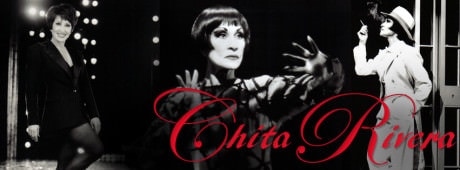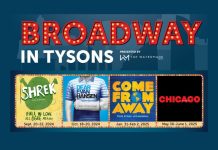I think we can safely call her the last Broadway Diva of the golden age. For she’s been putting together a career that is unique in this day and age in that it has been lived almost exclusively in live theatre, most often on Broadway, but in national tours as well, and in regional and stock theatres. She has had guest shots on the variety shows of the era, and she certainly is known to television audiences as well from her wins of The Kennedy Center Honors, the Presidential Medal of Freedom and her two Tony Awards.
https://youtu.be/rdIpctdHNu0
She has a film credit or two, but like so many of her peers from that age when theatre was king, she follows in the paths of Gwen Verdon, Ethel Merman, Mary Martin, Gertrude Lawrence, John Raitt, Alfred Drake, Ray Bolger, Bobby Clark in musicals, and Katherine Cornell, Tallulah Bankhead, Alfred Lunt, Lynn Fontanne, and Helen Hayes in plays. But they are all gone. Only Nathan Lane of the new generation, seems to be on that path –a stage star who returns to his roots every season, as Rivera has done.
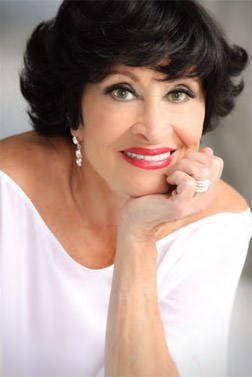
In her case, it all began over sixty years ago when she was hired for the chorus of the national company of Call Me Madam. A scholarship student in George Balanchine’s School of American Ballet, Rivera only attended that audition for the chorus job to accompany a friend, but the friend did not make the cut, and Chita did. As an aspiring ballerina, she had doubts about taking the job — but at seventeen, the lure of the road, the instinct she felt about belonging with her fellow ensemble dancers (“gypsies,” so called because they were always on the move, dancing from show to show) convinced her to give musical theatre a shot. She has never looked back, for Madam led to another chorus job in Can Can, and it was there that her fate was sealed.
Theatre tradition drummed its ways into the young performers who were starting out, and one of them was that chorus and bit players did not just drop into a star’s dressing room for a chat. Stars were sacrosanct and the brand new star of Can Can was Gwen Verdon, herself newly arrived on the NY scene from Hollywood. She didn’t have the lead in this Cole Porter musical, but she’d run away with the reviews, and was the talk of the town. So it was with great trepidation that Chita Rivera, who was in the chorus and doubling as an understudy, dropped into the Verdon dressing room one day, because she’d been invited to do so. Verdon graciously told her she had something special, that she should not be understudying anyone, that she should continue to develop as a personality on her own. She vividly remembers that advice, and when complaining once that she could never “fill the shoes” of one she was asked to understudy, she was told: “Then bring your own shoes.” And so she has done since 1953.
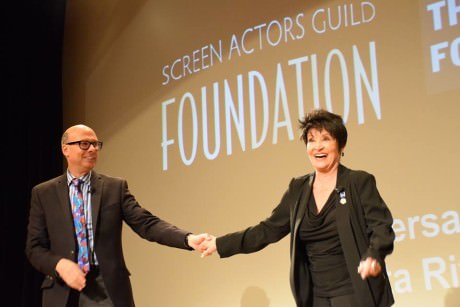
This “Conversations” occurred at the New School for Drama on September 11th. Sponsored by the Screen Actors Guild Foundation and the Outer Critics Circle, I’d expected to be surrounded by an older generation, eager to hear Rivera talk about her life in the theatre. She’d just closed a disappointingly short run in Kander, Ebb, and McNally’s The Visit, a show she’d starred in at three different regional theatres over the past 14 years, but she and its creators felt it was finally ready for the larger exposure that only Broadway can offer. Despite some excellent word of mouth and glowing reviews for her own performance, its dark story did not attract an audience large enough to give it a run.
But she was so pleased that it did make it into full production, that Lincoln Center had filmed it for its archives, that a first-rate cast recording had been cut, that it would have future life. But the most amazing revelation of the 90 minute talk was the vitality, the spirit, the wit, the wisdom in her responses to the questioning of Richard Ridge of BroadwayWorld. He has known the star for many years, and he was thoroughly prepared, questioning her about events throughout her working life. Asking who had influenced her early life, she quickly answered: “Doris Jones,” who was her first dance teacher in Washington, DC where she lived with her mother (her father died when she was seven) and her four siblings. Her mother was another great early influence and to properly channel the little girl’s energy, she enrolled her in dance class early on.
I came into her life just after her days in the chorus. She had just emerged as an individual performer, and had landed a featured role in The Shoestring Revue, in which she proved she could sing and create character. It played the President Theatre, a 300 seat box on West 48th Street. In 1955 I was just beginning my own career as a theatrical agent, and I was always looking for young talent I could add to my small list of personal clients while I simultaneously assisted my boss, who handled all the stars.
Our field was strictly musical theatre, and I remember going backstage to meet the lady who would one day be the subject of this article. In a small cast that included Bea Arthur and Arte Johnson, she leaped out at me, and I proposed right there on the spot in her dressing room (which she shared with several people). Yes, I asked her to be my client, and to my delight, she agreed. I remained her agent for the rest of my career as agent. Somewhere in the 1970s we ended our professional relationship when I returned to the stage myself and I am so happy to be able to tell you that I still get a thrill whenever I move into her space.
When she was starring in The Rink (for which she won the Tony Award) I was acting down the street from her theatre in End of the World, which only ran a month – but we had lunch between shows one day, and I was so proud I could say I was the only agent in the world who could claim to be appearing two theatres down from a star whom he used to represent. The lady has a light around her – she’s had her share of disappointment, duplicity, and personal loss, but I have never known a purer soul, or a more giving person, not diminished at all as she rose in stature in her chosen profession.
There were so many shows, and from each memories flow. During her interview, she remained accessible and dealt with a whole range of them. She recalled her meeting, at his home, with Leonard Bernstein, just the two of them, when he played her the songs he’d written for Anita, the character in West Side Story with which she ultimately lit up the stage.
As she sat there beside him on the piano bench, listening to “A Boy Like That,” “America,” and “Tonight,” she had an outer body experience that was frightening. A voice within her kept crying out: “Don’t let me throw up all over this gorgeous piano!” That calmed her, and her future was assured.
“Bring your own shoes” came from her idol Gwen Verdon, with whom she later co-starred in the original production of Chicago. There were times, she recalled, when she was standing in the dark next to Verdon just before they went into “Nowadays”, their final song in the show. Often one of her little voices (she claims they are always there, one on each side of her head) would say: “This is not happening. You are about to dance with Gwen Verdon. This is not happening.” But it was. From Bye Bye Birdie she remembered that Dick Van Dyke, gifted and giving, was a much better dancer than he realized.
https://youtu.be/NzNEuQRxgOY
In Nine she was thrilled to share a tango with Antonio Banderas, who loved all the ladies in that cast which was comprised only of ladies – no men other than Antonio – and she thought how lucky she was to have his shoulder to rest her foot on during the number, something all the women in the audience would have killed for, and their screams of pleasure when her extended leg reached all the way up, she enjoyed the moment even more than they. As time moved on, and musicals began to take on different forms, she became somewhat concerned that the Golden Age was ending. She complained of that to a colleague by asking: “What comes after a Golden Age?,” and the answer was: “Platinum, darling. Platinum.” She liked hearing that.
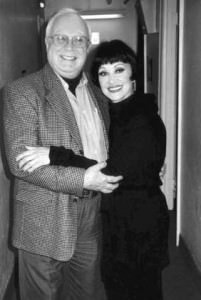
I could go on and on. As I said, the conversation did, for over 90 minutes, for hers has been a rich and plentiful life, and her ability to share it with us was overwhelmingly attractive. I’ve only begun to share her thoughts with you. The response when it was over was joyous and more like what you hear at a rap or rock concert. It was gratifying to learn that this theatre filled with students and young teachers were not only aware of a great star from another generation, but were inspired and grateful to take what she was offering.
Summing up, Rivera herself thought her own fulfillment came from being lucky enough to spend a lifetime in an environment where dancers looked out for one another. She told a quick tale about two of her “boys” (the dancers who support her in her cabaret act). One night she fell down during a number. And two of them who had been sitting on two stools behind her, literally fell off them in order to make the audience think her fall was part of the choreography. And again she told us that Gwen Verdon had so long ago told her to “bring her own shoes” and not to try to fill those of anyone else. If you’ve spent your life in that sort of work environment, if you have a nourishing family life as well, I think you’ll agree that’s a very special person who has indeed been blessed.
The great thing about Chita Rivera is that she knows that, and she has spent her life spreading those blessings to all who come in contact with her, on both sides of the footlights.
Conversations with Chita Rivera took place on Friday, September 11, 2015 at 1:00 PM at The New School – Auditorium on 12th Street – 66 West 12th Street, in New York City.


